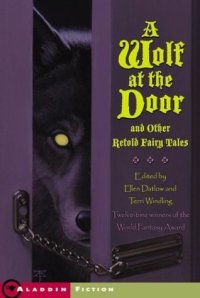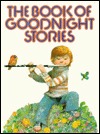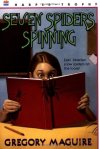A Wolf at the Door
166 pages
Edited by Ellen Datlow and Terri Windling
![]()
Wow, I just blasted through two books in a week, so expect a couple rapid fire posts over the next few days. I also just succumbed to another fever via child, so these posts may not make all that much sense. We shall see. In any case, I highly enjoyed reading A Wolf at the Door, even though it’s a retelling anthology. Retellings, as anyone who reads my reviews regularly will know, aren’t really my thing; I’m usually disappointed. However, through a combination of clever twists, witty writing and the use of fairy tales I loved from my childhood, the stories in A Wolf at the Door manage to sneak past my reading bias and into my heart.
 Be careful which talking animals you stop to chat with.
Be careful which talking animals you stop to chat with.
As I was reading the anthology, it was obvious where some of the stories took their roots from. Others not so much, but they were  very familiar to me. So much so that I couldn’t actually continue reading until I identified what the original fairy tale was. Fortunately I have a lovely book from my youth to reference. The Book of Goodnight Stories had been my bedside companion for years as a child until it disappeared and I thought I lost it forever. I found it tucked away at my parents house again; thankfully it survived the purge of the children’s things after we youngsters all moved out. It was what first put a true love of fairy tales in me. The book doesn’t Disney it up (though I suspect that they chose the tamest versions of each tale to include). It helped put me in the mindset to write The Black Horse (forthcoming, I promise) and it helped me identify almost every single story in A Wolf at the Door. Needless to say, if you like fairy tales, I recommend this book as well. I’ll be referring to it throughout this review, with page numbers from the book where each mentioned original fairy tale can be found.
very familiar to me. So much so that I couldn’t actually continue reading until I identified what the original fairy tale was. Fortunately I have a lovely book from my youth to reference. The Book of Goodnight Stories had been my bedside companion for years as a child until it disappeared and I thought I lost it forever. I found it tucked away at my parents house again; thankfully it survived the purge of the children’s things after we youngsters all moved out. It was what first put a true love of fairy tales in me. The book doesn’t Disney it up (though I suspect that they chose the tamest versions of each tale to include). It helped put me in the mindset to write The Black Horse (forthcoming, I promise) and it helped me identify almost every single story in A Wolf at the Door. Needless to say, if you like fairy tales, I recommend this book as well. I’ll be referring to it throughout this review, with page numbers from the book where each mentioned original fairy tale can be found.
The Months of Manhattan
Delia Sherman
![]()
Now, there are a lot of fairy tales out there that have a sweet, positively minded girl paired with an antagonistic, moody and cruel stepsister–particularly in which the former is rewarded for her kindness and the latter is punished for her crassness. That said, I got the feeling that this story had roots in The Three Wood Elves (p.31), though that could just be because The Three Wood Elves is one of my favorite fairy tales of all time. Sherman puts a nice spin on it though, by setting it tangibly in Manhattan and very cleverly weaves the city atmosphere into the story narrative.
Liz lives with her father in New York City, and things are pretty good. When her father remarries and Liz finds herself with a similarly named and similarly aged stepsister, at first she’s thrilled. Unfortunate, her new sister doesn’t feel the same, and really they’re not all that alike at all. While researching for a school assignment, Liz discovers a talking painting which takes a shine to her sunny, positive attitude. With her luck on the rise, will her stepsister be able to hide the jealousy in her already black heart?
At the school where I teach we occasionally show the children short, educational cartoons. One of these we show is called ‘Cinder Elephant’, which features a bunch of animal characters and compares animal foot prints as the prince searches for his lost elephant. In any case, Jane Yolen’s version of the original Cinderella (p. 71) story reminded me of that cartoon pretty much the whole time I read it. Yolen uses some wonderful imagery throughout the story, especially when she writes the two wicked step-sisters. She also sets the story in a curious mix of the typical fairy tale setting and a modern setting, a technique I saw employed a few times in this anthology and quite enjoyed.
Elly is… shall we say, big-boned? Not that it bothers her much. Elly dances to her own tune, and she’s quite happy about it too. But when her father remarries and introduces two stick thin step-sisters into her life, Elly’s happiness takes a dive. They are unimaginably cruel to her, however, even when they call her Cinder Elephant, she keeps a positive attitude and does her chores quickly, so she can read another book. Prince Junior, is having troubles of his own. He needs to find a wife, and his father organizes a ball to do just that. I’m sure you know where this story is headed, but there are some interesting spins along the way.
Neil Gaiman’s contribution to the anthology is exactly what the title says it is: instructions on how to survive a fairy tale, preferably in your original form or better. While it borrows elements from a number of different stories, I felt that much of its inspiration came from The Magic Pot (p. 29). At least, that was the first story that jumped into my mind when I read it. If you’re familiar with a number of fairy tales, I’m sure that Gaiman’s instructions will come as no surprise, but his writing, as always, charms and delights.
Mrs. Big: Jack and the Beanstalk Retold
Michael Cadnum
![]()
The story of Jack and the Beanstalk is a rather ubiquitous one, but we don’t often stop to look at its events from the point of view of the giants. I mean, Jack is essentially a thief, isn’t he? The giant lived in a castle in the clouds. How often do you suppose he was coming down and tormenting the villagers such to deserve to be robbed and then murdered? According to Michael Cadnum, the giant (and his wife) were nothing if not upstanding citizens, who happened to be unsuitably large for life around tiny, squish-able folk. So when a passing peddler offers them some choice real estate up above everyone else of course they take it. It doesn’t stop the thieves, of course, but revenge is a dish best served cold. And at the source of one’s miseries.
Falada: The Goose Girl’s Horse
Nancy Farmer
![]()
The Goose-Girl (p. 136) is another one of the fairy-tales I loved as a child, but I think I enjoyed the original more in this case. While I agree that Falada got the short end of the stick for her loyalty to a spineless, stupid girl, the ending of Nancy Farmer’s retelling of the story sort of took the wind out of the story’s sails. Stories that end with a character having known all along what was going to happen, or characters who are revealed to have manufactured tension for the protagonist make me wonder why I spent any time being concerned for her at all. In any case, Farmer retells The Goose-Girl from the first person point of view of Falada, a fairy horse kicked out of the fairy kingdom for not putting up with abuse against her. She’s tasked with carrying the Princess Belinda to her betrothed, but along the way she and Falada are cheated further and dropped down a peg. The only way they’re going to get out of this fresh mess is if Belinda learns some agency and finally speaks up for herself. Sometimes, you’ve got to make your own magic.
This story I couldn’t identify, (possibly Little Red Riding Hood? p. 241) but I liked it all the same. The setting and the concepts read uniquely for me, making it a very enjoyable story.
It’s the Ice Age. Glasina lives with her mother and father by the frozen sea shore, where shaggy lions which look like chrysanthemums have learned to speak and beg for scraps from the humans. They don’t speak especially intelligently, but a talking animal is a talking animal. When Glasina one day meets a very articulate wolf and invites him home for a meal, she and her family soon discover they’ve acquired a bit of an uncouth house guest. It’s not like they can just kick him out, either. I mean, what if he’s an enchanted prince? Is it really worth turning him back?
Ali Baba and the Forty Aliens
Janeen Webb
![]()
I loved this retelling. I wasn’t so sure of it at first but I absolutely loved the way Webb changed the original story, while keeping the same elements of the old one.
Alberto’s got a bit of a short stick. For one, he’s ended up with the nick name Ali Baba, and for another, he’s kind of an outsider, which has nothing to do at all with being excluded from the other kids private jokes and games. No, Ali is a real loner. He likes his black shirts and spiky hair, and his excursions out to the old Australian goldfields–mines long abandoned by prospectors to the delight of tourists and tourist shops. But one day it isn’t a few flecks of gold that Ali stumbles upon at one of the mines. No, it’s forty not-people, and a strange door concealing unimaginable riches. Ali can’t believe his luck, but sudden wealth is hard to hide, and his brother Dean is sure to catch wind of his new fortune.
At first I could only recognize the origins of this story, but I couldn’t find it in my book. Then I realized it was because the book put it in a frame story and called it The Tale of the Lost Alphabet. I don’t know what the name of the original story is, but in the version I know, the protagonist’s seven brothers were turned into rooks instead of swans, and not because they were too noisy but because they were lazy. In any case, Kelly Link retells this story in another mixture of fairy tale and modern setting, and borrows elements from a few other tales as well to round off her story. She ends her tale strongly, giving the reader some much needed catharsis for the emotion she’s built throughout.
Emma lives with her father the King and her six brothers in a big palace surrounded by memories of her dead mother, and she doesn’t say a word. When her father brings home an enchanted step-mother, Emma soon finds herself with six swans instead of six brothers. Of course, as nice as it is to have a new flock of pets around, her new step-mother doesn’t stop there, and soon everyone but silent Emma is a swan. With her step-mother gone and Emma all on her own, she must find away to bring back her family and come to terms with the loss of her mother for once and for all.
The Kingdom of Melting Glances
Katherine Vaz
![]()
This was definitely one of my favorites in the anthology. The imagery and the word-play both are amazing, and make the story as real as fanciful. I recognized this tale too, but it’s not in my fairytale book. Perhaps I read it on Faith Mudge’s blog, Beyond the Dreamline (another great fairy tale resource, if you’re looking). It’s a very sweet tale, sure to warm even the coldest hearts (by proximity to the Sun alone).
Rosa with the lily-shaped birthmark on her face has just lost her mother and father who she suspects have melted at last into a puddle of each other’s love Unfortunately, this leaves her alone with her two nasty, spiteful sisters who can’t stand that the kind-hearted Rosa might get anything good for herself. They thwart her every happiness, even going so far as to attempt to kill her hummingbird friend. Distraught, Rosa goes on a journey to find the injured birth. It will take her all across the sky, but Rosa is nothing if not determined.
This is a pretty straight forward, modern retelling of Hansel and Gretel (p. 160). Nix gives us the same wicked step-mother and weak-hearted father, but shakes up the witch’s candy house for an arcade shop in an abandoned part of town. Hansel immediately falls under the spell of the flickering video screens, but Gretel is spared. She’s got the talent for witching herself, and the witch who snatches them offers to teach her the craft. The catch is that if Gretel refuses, the witch will carve up the both of them and sell their organs on the black market. Naturally, Gretel accepts the witch’s offer, and naturally the witch comes to an unhappy end, but the method of which is employed here might surprise you.
If the author bio hadn’t said that this was a retelling of The Ugly Duckling I might never have known. It’s a very clever use of the source material to describe the gauntlet that is adolescence, and the balance between fitting in and being who one is meant to be.
Charise is a bit of an outsider. She’s picked on at school and called a nerd for her interests in Albert Einstein and science and reading. She finds her studies boring and lacking substance and longs to find herself in a place that can nurture her interests and accept her the way she is. Her aunt is mostly sympathetic to the girl’s pain, but when Charise is offered the opportunity to transfer to a high end school across town, her aunt’s answer is a soul crushing no. Stuck now in the unending torment of her school and her bullies, Charise must find out who she is: just another duckling, or a cygnet waiting for her snow white wings.
The Seven Stage a Comeback
George Maguire
![]()
 While I liked this story the least out of the anthology, I was pleasantly surprised to learn that George Maguire wrote what was one of my favorite childhood novels: Seven Spiders Spinning. In case anyone was wondering if my love of spiders just came from a whim one day, no. I’ve loved spiders for as long as I can remember, and this book is one of the reasons why.
While I liked this story the least out of the anthology, I was pleasantly surprised to learn that George Maguire wrote what was one of my favorite childhood novels: Seven Spiders Spinning. In case anyone was wondering if my love of spiders just came from a whim one day, no. I’ve loved spiders for as long as I can remember, and this book is one of the reasons why.
The Seven Stage a Comeback is most definitely not a spidery story, though one does get chills and creeps reading it. After Snow White left the dwarves, a huge void opened up in their lives which cause pain that no one could predict. The narrative unfolds in dialogue alone between the seven of them, and quickly turns stalkerish. But they’re dwarves, not humans. No one expects them to act with human decency. If they want to kidnap their beloved Snow White back to them, well, who could blame them?
The Twelve Dancing Princesses
Patricia A. McKillip
![]()
This story, as far as I can tell, doesn’t change anything at all from the original story of The Dance-Away Shoes (p. 104). While I loved the original tale, I’ve already read it, and perhaps expected a little more creativity for its retelling. Aside from the fairy princes being turned into the undead, really, nothing much else was changed.
A soldier returning home from the war shares the last of his meal with an old woman who in return tells him of a desperate king trying in vein to find out where his daughters keep going every night, wearing away their shoes doing whatever it is that they are doing. The king seems to have no trouble finding people to look into the task for him, which is amazing when we consider that it’s no secret he beheads those who fail. The old woman gives the soldier some advice to not eat or drink anything the princesses give him, and gifts him with an cloak of invisibility before sending him on his way. Figuring he’s got nothing else to lose, the soldier decides to give it a go, but what he finds out along the way will both delight and horrify him.
The next book on my reading list is The Stranger by Albert Camus.